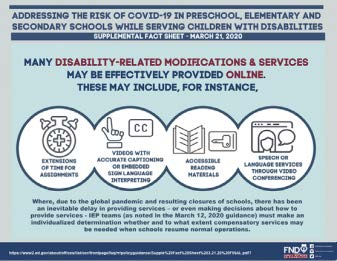WHAT'S HAPPENING
CONNECT AND DISCOVER
Join EP's Facebook Community

EP's revamped Facebook page welcomes you to share stories, discover resources and connect with the special needs community. Parents and families with members with special needs benefit greatly from meaningful interaction with peers facing the same challenges and joys. Facebook has provided the EP readership community with a convenient and effective platform to communicate, ask questions, promote events and share special moments.
Connect, Share and Discover with EP facebook.com/exceptionalparentmag
Visitors can access the latest news and articles from recent issues of EP Magazine, and provide feedback and insight of their own. EP's Facebook page an open community group for parents, grandparents, family and friends of people with special needs family members. It's an ideal place for both parents and professionals to share information and resources.
Parents, teachers, academics and professionals that are willing to help each other by sharing knowledge and resources are a vital part of the EP community. Like us today!
5 TIPS FOR PARENTS AND THEIR CHILDREN WITH SPECIAL NEEDS TO NAVIGATE THE COVID-19 CRISIS
BY LANI HESSEN AND KELLEY ABRAMS, PH.D.
A public health crisis. Unprecedented economic uncertainty. Upended family routines. Juggling remote work and distance learning. Increasingly impatient children who wonder, like their parents and guardians, when their lives will resume a semblance of normalcy.

POWER STRUGGLE: Chaotic situations can make you feel helpless as a parent or caregiver. Reminding yourself of what you can control for yourself and your child, however, can be empowering.
For all parents, the ongoing coronavirus pandemic has been a source of significant stress. But for parents of children with special needs, the pressures leveled by the COVID-19 crisis are especially acute. As working professionals, pa For all parents, the ongoing coronavirus pandemic has been a source of significant stress. But for parents of children with special needs, the pressures leveled by the COVID-19 crisis are especially acute. As working professionals, parents, and caregivers for special needs children, we know these pressures firsthand. With these tips and suggestions, you and your children can find manageable ways of living this new normal.
1. Practice self-care. Chances are, it's been awhile since your last flight. But anyone who's ever traveled on a plane remembers those airline safety videos in which parents are instructed, in the event of an emergency, to put on their own oxygen masks first before assisting their children.
The same principle — you're only in a position to care for your kids if you're able to care for yourself — applies to parenting generally. But while self-care is important at all times, it's absolutely essential during these turbulent times. To be sure, practicing self-care might sound like an unrealistic luxury when you're trying to juggle working from home, overseeing your kids' remote learning, attending to the Mt. Everest of dishes that's piled up in the kitchen sink, and attempting to cope with the To be sure, practicing self-care might sound like an unrealistic luxury when you're trying to juggle working from home, overseeing your kids' remote learning, attending to the Mt. Everest of dishes that's piled up in the kitchen sink, and attempting to cope with the fear and anxiety these times are triggering. But these added stresses are precisely why it's imperative to nurture ourselves. While healthy stress — the rigors of training for a marathon, or the rush of planning a child's birthday party — motivates us, unhealthy stress takes a toll. To monitor your unhealthy stress levels, ask yourself how you're feeling each day. Are you feeling exhausted? Have you become more irritable? Are you under- or overeating? Is it a struggle to concentrate? If the answers to any (or all) of these questions is "yes," be gentle with yourself. Feeling this stress is natural — and it can be managed. Listen to music. Exercise — even if it's a 10-minute walk around the block. Enjoy (or create!) artwork. Treat yourself to a hot shower or bath. Consider small steps towards learning new hobbies or skills such as jigsaw puzzles or knitting. Meditate. Breathe deeply. Little acts can reap large rewards in terms of calming your nervous system and allowing you to be more present and available.
QUESTIONS & ANSWERS ON PROVIDING SERVICES TO CHILDREN WITH DISABILITIES DURING A COVID-19 OUTBREAK
Supplemental Fact Sheet on Addressing the Risk of COVID-19 in Preschool, Elementary and Secondary Schools While Serving Children with Disabilities. March 21, 2020. The following graphics have been created based on the document, Questions and Answers on Providing Services to Children with Disabilities During a Covid-19 Outbreak, released on March 13, 2020, by the U.S. Department of Education responding to the COVID-19 OUTBREAK.
fndusa.org/esedownload/providing-services-children-disabilities-covid19

2. Incorporate chores and self-care routines. Involving your children with special needs in basic daily chores can help build their self-reliance and provides opportunities for recognition and bonding time.
Whether it's folding and hanging laundry, sorting utensils, or watering plants, completing chores boosts self-confidence, gives kids a sense of control, and develops both fine and gross motor skills. Breaking down these tasks into smaller, manageable steps, skills. Breaking down these tasks into smaller, manageable steps, supports your child's independence and cognitive skills while also helping to keep frustration levels low. Keep in mind that success will look different from day to day, completing part of any task can be a success.
3. Alleviate your child's fears through empathetic communication. When possible, talk to your children with special needs openly and honestly about the coronavirus situation, while respecting necessary limits and avoiding information overload. Acknowledge what's unfolding across the globe by putting into words what your child is already sensing. After conveying the truth in an age-appropriate manner, focus on specific positive messages to allay fears. Remind your child that staying home will keep us safe. Talk about how doctors, nurses, researchers, and essential workers are rising to the occasion. In these conversations, you may well find that not only will your child feel better, but you'll also feel reassured.
4. Work with your child to build resilience. Negative emotions and challenging behaviors are an inevitable part of raising children — and it's likely that you will see an uptick in these challenges during this time. Take this as an opportunity to help your child build resilience. Encourage honesty about feelings — and accept whatever feelings they express. Work with your child to identify emotions — whether fear, anger, or confusion. For younger or nonverbal children, pictures and other visual aids are especially useful. Navigating these challenges together will boost your child's problem-solving skills, remind your child that they have an intact family support system, and facilitate better communication skills.
5. Build a routine. Uncertain times and chaotic situations wholly beyond your control can make you feel helpless as a parent or caregiver. Reminding yourself of what you can control for yourself and your child, however, can be empowering. And setting daily routines is within our power. By building a daily routine, you'll provide yourself and your child a sense of stability, reduce stress and anxiety, and establish daily positive habits. Incorporate fun and sensory activities that fit your child's needs and interests — movement breaks, games, baking, music time, journaling, drawing, quiet spaces, virtual art museum or zoo visits, and the like.
Infusing as much consistency and structure as possible into our daily lives can be calming during times of stress. Provide visual schedules and visual timers to help your child's transition from one task to another. Provide specific praise to your child when they show adaptability. Use descriptive vocabulary as you praise. For example, "It's so helpful when you help me with the laundry." A little positive reinforcement can go a long way toward making unsettling circumstances more manageable.
As people across the globe find their own ways of adjusting to life in the shadow of coronavirus, people with special needs, and their parents and caregivers, face a unique set of challenges. In a crisis that's given rise to many quiet heroes – from the front-line medical workers putting their own health at risk to protect and treat others, to the community volunteers arranging deliveries for their vulnerable and elderly neighbors – those with special needs and their caregivers are showing their own bravery and determination to carry on as best as possible during the crisis. As we each seek workable ways of getting through this common crisis, we shouldn't lose sight of that.•
ABOUT THE AUTHORS: Kelley Abrams, Ph.D., is Director of Product Management-Digital Therapeutics; and Lani Hessen, OTR/L, Clinical Specialist Cognoa, is a licensed pediatric occupational therapist with expertise in childhood development.
COVID-19 AND BEYOND
How the FDA Commissioner Can Immediately Speed-Up Medical Discovery
Congress made legislative attempts in the past to increase medical discovery, such as enacting the Orphan Drug and Translational Research Acts, but they are very limited in scope. And the same holds true with, due to the COVID-19 pandemic, the Administration's new rules regarding relaxation of regulations to enter clinical trials in national emergency situations.
With the pandemic and associated national pandemic fear generated by COVID-19, a general awareness has emerged for the urgent need to significantly reduce the barriers for volunteers to enter promising clinical studies. But there is no practical, doable, effective, and speedy way yet offered, except that which was proposed by physician Dr. Stephen L. DeFelice (in his book), that physicians be permitted to volunteer for clinical research studies much more easily than others. Who would object? More potential therapies would be tested, and more breakthrough therapies and cures discovered. He then coined the term, "doctornauts," to describe such altruistic physicians.
In his first book, Drug Discovery: The Pending Crisis (published in 1972), DeFelice, the founder of The Foundation for Innovation in Medicine (FIM), correctly predicted that there would be fewer cures in the near future. He has always asked, "When was the last cure?" The reason for the rarity of cures? Medical discovery of new therapies can only be discovered in clinical studies. Penicillin and insulin were discovered when administered to patients with bacterial infections or diabetes. For a variety of reasons, such as the thalidomide tragedy, we became excessively concerned with safety, including the exaggerated dangers to volunteers in clinical research, but puzzlingly ignoring the value of this critical step. As a result, we established highly costly and risk-averse ponderous rules and regulations which, unnoticed, eliminated our huge reservoir of creative, underfunded physicians and scientists, as well as our major research institutions such as our pharmaceutical companies. This message went unnoticed until Dr. DeFelice met with the physician and then- Senate Majority Leader, Bill Frist, who, as a previous researcher, quickly understood the concept and circulated a draft of the Doctornaut Act. Unfortunately, it met with little interest. But, COVID-19 has sparked a dramatic cultural wake-up call to the fundamental role of clinical research in attacking disease. This awakening is fueled by the alarming reality that the only remedy that we had in our medical armamentarium was quarantine; and, due to genetic bioengineering, we can expect more lethal viral and also bacterial pandemics in the near future. One core message is that speed is the key, and "doctornauts" provide that.
To immediately and legally establish doctornauts, FIM proposes a path that the FDA Commissioner and physician, Stephen Hahn, already has authority to implement. He, with a single stroke of his pen, can issue a simple addition to already established regulations which regulatory language is described in the FIM proposal. It creates a two-tier system with Institutional Review Boards or IRBs, committees which oversee clinical trials, to help the already-swamped FDA. The educational FIM proposal deals with the history and rationale regarding physician volunteers, or doctornauts, which can be helpful to spur the Commissioner to action.
Now consider the following: if the doctornaut or physician volunteer venture is successful, dramatic medical advances discovered in them can also be readily applied to children with diseases and disabili ies. And finally, it will substantially help in reducing health care costs within the near term.

Stephen L. DeFelice, M.D., Chairman and Founder of The Foundation for Innovation in Medicine (FIM), offers his Proposal to help spur the Commissioner to action: fimdefelice.org/news/covid-19-and-beyond